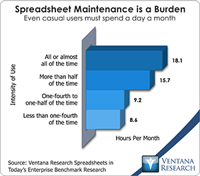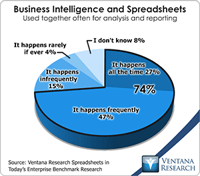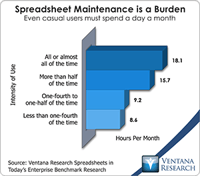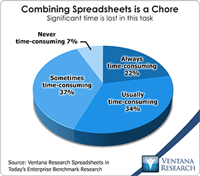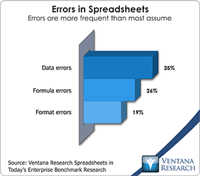The spreadsheet is one of the five most important advances in business management over the last 50 years. It has changed all aspects of running an organization. It was the original “killer app” that made people go out and buy personal computers. So you see I’m enthusiastic about spreadsheets, but I realize they have limits that must be respected to work efficiently. One of the more important findings from our benchmark research Spreadsheets for Today’s Enterprise was about the time spent in...
Read More
Topics:
Office of Finance,
Operational Performance Management (OPM),
Reporting,
enterprise spreadsheet,
Analytics,
Business Analytics,
Visualization,
Business Performance Management (BPM),
Customer Performance Management (CPM),
Financial Performance Management (FPM),
Information Applications (IA),
Information Management (IM),
Risk,
Sales Performance Management (SPM),
Supply Chain Performance Management (SCPM),
Workforce Performance Management (WPM),
benchmark,
Financial Performance Management
I’ve been using spreadsheets for more than 30 years. I consider this technology tool among the five most important advances in business management of the 20th century. Spreadsheets have revolutionized many aspects of running an organization. Yet as enthusiastic as I am about them, I know the limits of desktop spreadsheets and the price we pay if we fail to respect those limits. The essential problem arises when people use desktop spreadsheets for purposes beyond what they were originally...
Read More
Topics:
Office of Finance,
Operational Performance Management (OPM),
Reporting,
enterprise spreadsheet,
Analytics,
Business Analytics,
Business Intelligence,
Governance, Risk & Compliance (GRC),
Visualization,
Business Performance Management (BPM),
Customer Performance Management (CPM),
Financial Performance Management (FPM),
Information Applications (IA),
Information Management (IM),
Risk,
Sales Performance Management (SPM),
Supply Chain Performance Management (SCPM),
Workforce Performance Management (WPM),
benchmark,
Financial Performance Management
Read More
Topics:
Office of Finance,
Operational Performance Management (OPM),
Reporting,
enterprise spreadsheet,
Analytics,
Visualization,
Business Performance Management (BPM),
Customer Performance Management (CPM),
Financial Performance Management (FPM),
Risk,
Sales Performance Management (SPM),
Supply Chain Performance Management (SCPM),
Workforce Performance Management (WPM),
benchmark,
Financial Performance Management
I’ve been using electronic spreadsheets for more than 30 years. I consider this technology among the 20th century’s top five most important advances in business management. Spreadsheets have revolutionized every aspect of running any organization. A spreadsheet (specifically, VisiCalc) was the original “killer app” that made business people feel the necessity to buy a personal computer.
Read More
Topics:
Office of Finance,
Operational Performance Management (OPM),
Reporting,
enterprise spreadsheet,
Analytics,
Business Analytics,
Visualization,
Business Performance Management (BPM),
Customer Performance Management (CPM),
Financial Performance Management (FPM),
Information Applications (IA),
Information Management (IM),
Risk,
Sales Performance Management (SPM),
Supply Chain Performance Management (SCPM),
Workforce Performance Management (WPM),
benchmark,
Financial Performance Management
The electronic spreadsheet is among the top five most important advances in business management to come along in the last hundred years. It revolutionized almost all aspects of running an organization. It was the original “killer app” that made it necessary for people to go out and buy a personal computer. Yet our recent benchmark research project Spreadsheet Use in Today’s Enterprise confirmed advice we have been giving for the past decade: Spreadsheets are a fabulous tool but they have...
Read More
Topics:
Office of Finance,
Reporting,
enterprise spreadsheet,
Analytics,
Business Analytics,
Visualization,
Business Performance Management (BPM),
Financial Performance Management (FPM),
Risk,
benchmark,
Financial Performance Management
